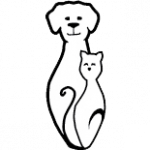Rehmannia 8 (Ba Wei Di Huang Wan)
This formula is the basic Kidney Qi tonic of Chinese Herbal medicine. It warms the Yang, generates Kidney Qi, and gently tonifies Yin adn Blood, making it popular as a safe all round tonic for geriatrics. The main use is for the treatment of chronic renal failure in dogs and cats, where it commonly reverses mild-moderate aotemia. Because it probably restores renal function by increasing renal blood flow, it is contra-indicated in acute kidney inflammation, where blood flow is already increased. It is, however, safe for use in hypertension from reduced kidney perfusion. General symptms for its use include: chills, weak pulse, purplish tongue, low back weakness or stiffness, increased urination or incontinence, bed wetting. If an animal is too "damp" for the formula, it may precipitate some vomiting, which resolves immediately as soon as the formula is discontinued. The Aconite used in the formula has been treated to render it non-toxic.
Veterinary Medical Indications
Ba Wei Di Huang Wan treats:
• Dampness Accumulation
• Kidney Yang Deficiency
• Kidney Qi Deficiency
• Blood Deficiency
Symptoms Treated
Urinary/Renal • Azotemia • Crystalluria • Oliguria • Polyuria • Proteinuria
• Urinary Incontinence
Respiratory • Cough • Dyspnea
Gastrointestinal • Vomiting
Endocrine • Hyperglycemia • Increased Thirst • Weight Loss
Neurologic • Proprioceptive Deficits
Reproductive • Anestrus •Impotence •Infertility
Musculoskeletal • Back Pain •Muscle Atrophy •Stiffness •Hind Limb Weakness
Cardiovascular • Bradycardia • Hypertension
Hematologic • Anemia
Ocular • Vision Loss
Otic • Deafness
Diseases Treated
• Glomerulonephritis
• Renal Insufficiency
• Renal Failure
• Incontinence - Urinary
• Nephrotic Syndrome
• Inappropriate Urination
• Asthma
• Diabetes Mellitus
• Hypothyroidism
• Degenerative Myleopathy
• Infertility
• Anestrus
• Impotence
• Arthritis
• Degenerative Joint Disease
• Congestive Heart Failure
• Hypertension
• Anemia
• Vision Loss
• Hearing Loss
Pulse and tongue findings can help confirm the suitability of Ba Wei Di Huang Wan to a patient. The pulse of animals that benefit from Rehmannia Eight combination is typically weak, reflecting their reduced vitality. The tongue is usually swollen with a slightly purplish cast.
Ba Wei Di Huang Wan contains the following herbs:
Poria
Prepared Aconite root
Moutan bark
Cinnamon bark
Prepared Rehmannia root
Chinese Yam rhizome
Cornus fruit
Alisma tuber
Rehmannia, Cornus and Chinese Yam have a strong moistening or Yin tonifying effect. Prepared Rehmannia is warming and nourishes Kidney Yin and Blood. Cornus nourishes Liver Blood and Yin, and helps astringe Kidney Essence leakage. Chinese Yam astringes Essence as well, helping to avoid dryness in the Kidneys, Lung, and middle burner. Balancing the potential cloying effects of these three Yin tonics are three moving and draining herbs. Alisma balances the moistening effect of Rehmannia in the lower burner by promoting urination. Poria provides gentle Spleen support and leeches Damp from the middle burner where Chinese Yam acts. Moutan Bark clears Heat and drains Fire from the Liver, moderating the warming effects of Cornus. Aconite and Cinnamon warm the Kidney Yang. Originally, Cinnamon twig was used in Rehmannia Eight to invigorate peripheral circulation. The Tang dynasty changed it to Cinnamon bark, which has a greater affinity for the lower burner and the Kidneys.
An uncommon side effect of Rehmannia Eight is vomiting, which resolves once the formula is discontinued. Lower doses may still provide renal support, but not produce side effects. Rehmannia Eight is contraindicated in acute renal inflammation where renal blood flow is already increased. It is, however, safe for patients with renal hypertension secondary to reduced renal perfusion. The aconite used in the formula is specially treated to render it non-toxic
© Copyright 2011 LifeLearn Inc. Used and/or modified with permission under license. This content written by LifeLearn Animal Health (LifeLearn Inc.) is licensed to this practice for the personal use of our clients. Any copying, printing or further distribution is prohibited without the express written consent of LifeLearn. This content does not contain all available information for any referenced medications and has not been reviewed by the FDA Center for Veterinary Medicine, or Health Canada Veterinary Drugs Doctorate. This content may help answer commonly asked questions, but is not a substitute for medical advice, or a proper consultation and/or clinical examination of your pet by a veterinarian. Please contact your veterinarian if you have any questions or concerns about your pet’s health.

